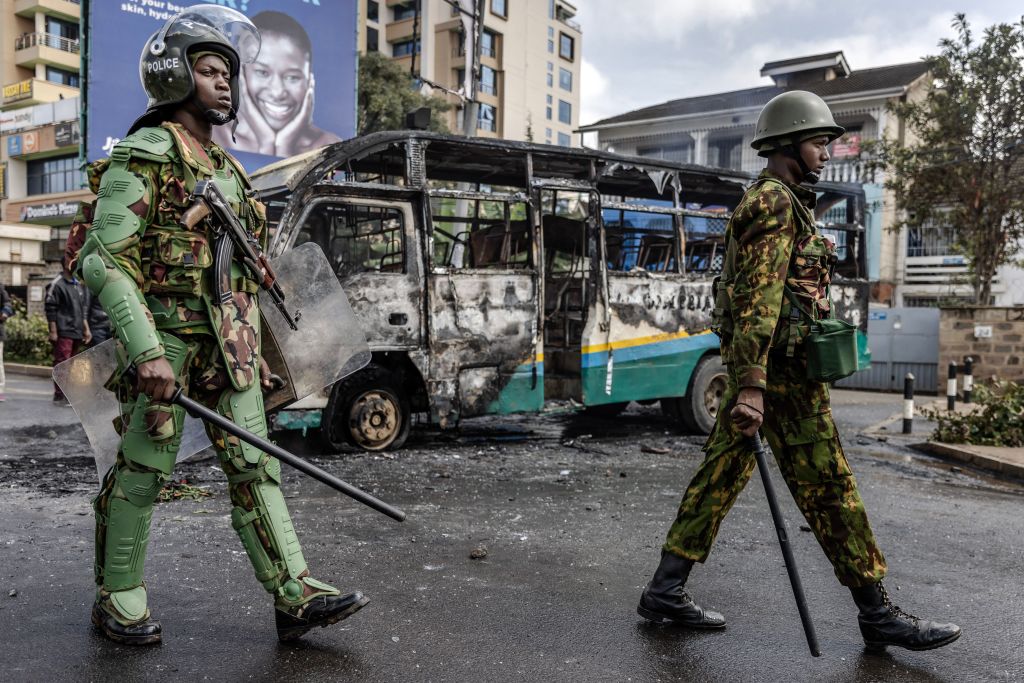ADF STAFF
In 2021, Kenya launched a program to send 400 police officers each year to China for training, despite concerns that China’s authoritarian approach to policing conflicts with Kenyan laws protecting free speech and human rights.
In recent years, China has signed policing agreements with 40 African countries to train thousands of law enforcement officers, presidential guards and other non-military security officials. Together they make up about 35% of foreign security forces receiving training by China’s Ministry of Public Security.
The training has two goals: first, to introduce police officers to Chinese-style policing that emphasizes control of the population and, second, to create a police force that can help protect China’s businesses and infrastructure abroad.
Many of these agreements, such as training of security for Kenya’s Chinese-built Standard Gauge Railway, target projects that are part of the Belt and Road Initiative.
From banks to copper mines to restaurants, Africa is home to about 10,000 Chinese-owned businesses and another 2,000 state-owned enterprises. As China’s presence has grown across Africa, Chinese workers and businesses have become targets for violence, kidnappings and protests. Earlier this year, nine workers were killed at a newly opened Chinese gold mine in the Central African Republic.
The owners of Chinese enterprises have urged Beijing to do more to protect them, which has prompted the government to invest more in both private security companies and African policing.
The tactics China uses to cultivate law-enforcement agencies go beyond those used to build military relationships, according to analyst Paul Nantulya with the Africa Center for Strategic Studies (ACSS).
“By definition, law enforcement is much more intrusive and closely linked to internal security and domestic politics,” Nantulya wrote in a report by The National Bureau of Asian Research titled “Political Front Lines: China’s Pursuit of Influence in Africa.” “China has a particularly receptive audience among some African leaders concerned with regime survival.”
China’s emphasis in Africa has been on creating “security with Chinese characteristics” focused on maintaining stability above all else, according to Nantulya. China’s “no questions asked” approach includes little concern about how countries ultimately use the training and equipment they receive.
While much of the training happens in China, some takes place on the African continent, such as a joint Algerian-Chinese training program conducted at the Algerian Ministry of Interior and Local Authorities from 2015 to 2018.
Critics argue that China’s influence on African policing spreads its brand of authoritarianism, which condones detaining and threatening dissidents, journalists and others who challenge the government — a right that is crucial to democracy.
“Those pushing for higher standards argue that context matters,” Nantulya wrote in an analysis for the ACSS. “This is especially crucial as police, intelligence, and paramilitaries are among the most feared and corrupt institutions in Africa.”
China’s view of police power, and its willingness to look the other way at how that power is used, can encourage corruption among police, according to David Shinn, a professor at George Washington University’s Elliott School of International Affairs.
In South Africa, which has the continent’s largest Chinese population, dozens of officers with Johannesburg’s Metro Police Department have been trained by China. The country has also established more than a dozen Chinese-staffed police units and made Mandarin a required language for police trainees.
In 2019, documents revealed a contingent of South African police officers had been training in China in 2016 to serve as what the Daily Maverick described as a “death squad” targeting political dissenters. The group was also sent undercover to patrol border crossings with Zimbabwe and Mozambique.
The group was disbanded under President Cyril Ramaphosa.
“While it was disbanded by the Ramaphosa administration, the story underlined the dangers of unscrupulous officials collaborating with their Chinese counterparts to create non-statutory forces,” Nantulya wrote for the ACSS.
Beyond Africa, other nations are dropping their Chinese training. Fiji did so after determining that China’s approach was incompatible with Fiji’s democratic norms.
“Our system of democracy and justice systems are different so we will go back to those that have similar systems with us,” Prime Minister Sitiveni Rabuka said in a statement.

